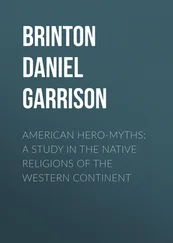Daniel Brinton - The Religious Sentiment
Здесь есть возможность читать онлайн «Daniel Brinton - The Religious Sentiment» — ознакомительный отрывок электронной книги совершенно бесплатно, а после прочтения отрывка купить полную версию. В некоторых случаях можно слушать аудио, скачать через торрент в формате fb2 и присутствует краткое содержание. ISBN: , Жанр: foreign_antique, foreign_prose, на английском языке. Описание произведения, (предисловие) а так же отзывы посетителей доступны на портале библиотеки ЛибКат.
- Название:The Religious Sentiment
- Автор:
- Жанр:
- Год:неизвестен
- ISBN:http://www.gutenberg.org/ebooks/30061
- Рейтинг книги:3 / 5. Голосов: 1
-
Избранное:Добавить в избранное
- Отзывы:
-
Ваша оценка:
- 60
- 1
- 2
- 3
- 4
- 5
The Religious Sentiment: краткое содержание, описание и аннотация
Предлагаем к чтению аннотацию, описание, краткое содержание или предисловие (зависит от того, что написал сам автор книги «The Religious Sentiment»). Если вы не нашли необходимую информацию о книге — напишите в комментариях, мы постараемся отыскать её.
The Religious Sentiment — читать онлайн ознакомительный отрывок
Ниже представлен текст книги, разбитый по страницам. Система сохранения места последней прочитанной страницы, позволяет с удобством читать онлайн бесплатно книгу «The Religious Sentiment», без необходимости каждый раз заново искать на чём Вы остановились. Поставьте закладку, и сможете в любой момент перейти на страницу, на которой закончили чтение.
Интервал:
Закладка:
Daniel G. Brinton
The Religious Sentiment / Its Source and Aim: A Contribution to the Science and / Philosophy of Religion
Mythology, since it began to receive a scientific handling at all, has been treated as a subordinate branch of history or of ethnology. The “science of religion,” as we know it in the works of Burnouf, Müller, and others, is a comparison of systems of worship in their historic development. The deeper inquiry as to what in the mind of man gave birth to religion in any of its forms, what spirit breathed and is ever breathing life into these dry bones, this, the final and highest question of all, has had but passing or prejudiced attention. To its investigation this book is devoted.
The analysis of the religious sentiment I offer is an inductive one, whose outlines were furnished by a preliminary study of the religions of the native race of America, a field selected as most favorable by reason of the simplicity of many of its cults, and the absence of theories respecting them. This study was embodied in “The Myths of the New World; a Treatise on the Symbolism and Mythology of the Red Race of America” (second edition, N. Y. 1876).
The results thus obtained I have in the present work expanded by including in the survey the historic religions of the Old World, and submitted the whole for solution to the Laws of Mind, regarded as physiological elements of growth, and to the Laws of Thought, these, as formal only, being held as nowise a development of those. This latter position, which is not conceded by the reigning school of psychology, I have taken pains to explain and defend as far as consistent with the plan of this treatise; but I am well aware that to say all that can be said in proof of it, would take much more space than here allowed.
The main questions I have had before me in writing this volume have an interest beyond those which mere science propounds. What led men to imagine gods at all? What still prompts enlightened nations to worship? Is prayer of any avail, or of none? Is faith the last ground of adoration, or is reason? Is religion a transient phase of development, or is it the chief end of man? What is its warrant of continuance? If it overlive this day of crumbling theologies, whence will come its reprieve?
To such inquiries as these, answers satisfactory to thinking men of this time can, I believe, be given only by an inductive study of religions, supported by a sound psychology, and conducted in a spirit which acknowledges as possibly rightful, the reverence which every system claims. Those I propose, inadequate though they may be, can at any rate pretend to be the result of honest labor.
Philadelphia, January , 1876.
The distinction between the Science and the Philosophy of religion. It is assumed (1) that religions are products of thought, (2) that they have a unity of kind and purpose. They can be studied by the methods of natural science applied to Mind.
Mind is co-extensive with organism. Sensation and Emotion are prominent marks of it. These are either pleasurable or painful; the latter diminish vital motions, the former increase them. This is a product of natural selection. A mis-reading of these facts is the fallacy of Buddhism and other pessimistic systems. Pleasure comes from continuous action. This is illustrated by the esthetic emotions, volition and consciousness.
The climax of mind is Intellect. Physical changes accompany thought but cannot measure it. Relations of thought and feeling. Truth is its only measure. Truth, like pleasure, is desired for its preservative powers. It is reached through the laws of thought.
These laws are: (1) the natural order of the association of ideas, (2) the methods of applied logic, (3) the forms of correct reasoning. The last allow of mathematical expression. They are three in number, called those of Determination, Limitation and Excluded Middle.
The last is the key-stone of religious philosophy. Its diverse interpretations. Its mathematical expres ion shows that it does not relate to contradictories. But certain concrete analytic propositions, relating to contraries, do have this form. The contrary as distinguished from the privative. The Conditioned and Unconditioned, the Knowable and Unknowable are not true contradictions. The synthesis of contraries is theoretic only.
Errors as to the limits of possible explanation corrected by these distinctions. The formal law is the last and complete explanation. The relations of thought, belief and being.
CHAPTER I
THE BEARING OF THE LAWS OF MIND ON RELIGION
The Science of Religion is one of the branches of general historical science. It embraces, as the domain of its investigation, all recorded facts relating to the displays of the Religious Sentiment. Its limits are defined by those facts, and the legitimate inferences from them. Its aim is to ascertain the constitutive laws of the origin and spread of religions, and to depict the influence they have exerted on the general life of mankind.
The question whether a given religion is true or false cannot present itself in this form as a proper subject of scientific inquiry. The most that can be asked is, whether some one system is best suited to a specified condition of the individual or the community.
The higher inquiry is the object of the Philosophy of Religion. This branch of study aims to pass beyond recorded facts and local adjustments in order to weigh the theoretical claims of religions, and measure their greater or less conformity with abstract truth. The formal or regulative laws of religious thought occupy it.
Theology, dogmatic or polemic, is an explanatory defence of some particular faith. Together with mythology and symbolism, it furnishes the material from which the Science and Philosophy of Religion seek to educe the laws and frame the generalizations which will explain the source and aim of religion in general.
The common source of all devotional displays is the Religious Sentiment, a complex feeling, a thorough understanding of which is an essential preliminary to the study of religious systems.
Such a study proceeds on the assumption that all religions are products of thought, commenced and continued in accordance with the laws of the human mind, and, therefore, comprehensible to the extent to which these laws are known. No one disputes this, except in reference to his own religion. This, he is apt to assert, had something “supernatural” about its origin. If this word be correctly used, it may stand without cavil. The “natural” is that of which we know in whole or in part the laws; the “supernatural” means that of which we do not at present know in any degree the laws. The domain of the supernatural diminishes in the ratio of the increase of knowledge; and the inference that it also is absolutely under the control of law, is not only allowable but obligatory.
A second assumption must be that there is a unity of kind and purpose in all religions. Without this, no common law can exist for them. Such a law must hold good in all ages, in every condition of society, and in each instance. Hence those who explain religious systems as forms of government, or as systems of ethics, or as misconceived history, or as theories of natural philosophy, must be prepared to make their view good when it is universally applied, or else renounce the possibility of a Science of Religion; while those who would except their own system from what they grant is the law of all others, violate the principles of investigation and thereby the canons of truth.
The methods of science are everywhere alike. Has the naturalist to explain an organism, he begins with its elements or proximate principles as obtained by analysis; he thence passes to the tissues and fluids which compose its members; these he considers first in a state of repose, their structure and their connections; then he examines their functions, the laws of their growth and action; and finally he has recourse to the doctrine of relations, la théorie des milieux , to define the conditions of its existence. Were such a method applied to a religion, it would lead us first to study its psychological elements, then the various expressions in word and act to which these give occasion, next the record of its growth and decay, and finally from these to gather the circumstantials of human life and culture which led to its historic existence.
Читать дальшеИнтервал:
Закладка:
Похожие книги на «The Religious Sentiment»
Представляем Вашему вниманию похожие книги на «The Religious Sentiment» списком для выбора. Мы отобрали схожую по названию и смыслу литературу в надежде предоставить читателям больше вариантов отыскать новые, интересные, ещё непрочитанные произведения.
Обсуждение, отзывы о книге «The Religious Sentiment» и просто собственные мнения читателей. Оставьте ваши комментарии, напишите, что Вы думаете о произведении, его смысле или главных героях. Укажите что конкретно понравилось, а что нет, и почему Вы так считаете.












